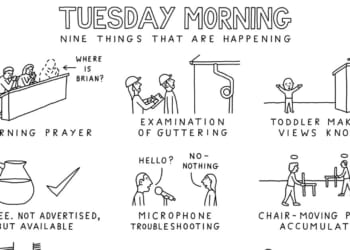(The Washington Stand) — Tens of thousands of people have been laid off from their jobs in America. History has seen its share of mass layoffs – sparked by wars, devastating famines, economic collapses, or other seismic disruptions. But today’s crisis feels distinctly modern. In July alone, the technology sector hemorrhaged over 10,000 jobs, marking a jarring 36 percent surge in layoffs for the industry. The culprit? Artificial intelligence (AI).
A recent report from Challenger, Gray & Christmas (CGC) laid bare the scale of this upheaval. “So far this year,” the report reads, “companies have announced 806,383 job cuts, the highest YTD since 2020 when 1,847,696 were announced. It is up 75% from the 460,530 job cuts announced through the first seven months of last year and is up 6% from the 2024 full year total of 761,358.”
CGC Senior Vice President Andrew Challenger pointed to multiple drivers, including the Department of Government Efficiency (DOGE), an initiative launched by President Donald Trump to slash government waste, including what he deemed redundant jobs.
READ: RFK Jr. cuts $500 million for mRNA vaccine projects, says no new contracts will be issued
“We are seeing the Federal budget cuts implemented by DOGE impact non-profits and healthcare in addition to the government,” Challenger noted. But it’s not just DOGE. “AI was cited for over 10,000 cuts last month, and tariff concerns have impacted nearly 6,000 jobs this year,” Challenger added. Among these, AI’s grip on the technology sector stands out as the most transformative. According to the report, “Technology is the leading private sector in job cuts.” In fact, “The industry is being reshaped by the advancement of artificial intelligence.”
AI has increasingly been at the forefront of national dialogue. With its advancement and increased use come ethical concerns, significantly uncharted technological territory, and, evidently, even a hard hit on the job market. Last month, Breitbart News reported how AI advancement is affecting kids coming out of college – even describing it as a threat to traditional career paths.
“For graduates,” the outlet wrote, “the competition is fierce. Not only are there fewer jobs, but they’re also up against laid-off junior workers from previous years. Platforms like Handshake report a 15 percent drop in entry-level job postings this year, while applications per job are up 30 percent. Internships are following a similar pattern.” Breitbart added, “The consequences extend beyond individual job seekers. As companies rely more on AI and hire fewer young workers, they risk shrinking the pipeline of talent that will eventually move into higher-level positions.”
The CGC report concluded: while all hiring announcements remain “well below pre-pandemic levels … technology hiring continues to decline, with companies in the sector announcing just 5,510 new jobs in 2025, down 58% from 13,263 in the same period last year.”
So, what’s the big deal? Technology evolves, AI is the shiny new toy – why the alarm? I’m not one to make mountains out of molehills, but AI’s growing dominance does raise real concerns that are worth our attention. Here’s why.
Real talent? Glossed over
Since we’re talking about jobs, let’s start with the obvious. AI isn’t just disrupting tech – it’s a wrecking ball across fields like art, writing, and other creative industries. Human ingenuity, honed through years of practice, is being sidelined by algorithms that churn out passable (but soulless) imitations. Graphic designers, copywriters, and illustrators are watching their livelihoods erode as companies opt for AI-generated content that’s faster and cheaper, if not – and in some cases – better.
Viral videos of bears, bunnies, raccoons, or other animals bouncing on trampolines have flooded social media feeds. While some viewers quickly spotted the artificial nature of these clips, many were fooled, sparking widespread conversations. The reason? AI-generated content is becoming so convincing that countless people accept it as real without a second thought. As AI’s prominence grows, we’re still learning to spot its telltale signs.
The takeaway is clear: AI can produce images, videos, music, spreadsheets, and more in seconds, often with stunning realism. Though glitches and imperfections persist – issues developers are undoubtedly racing to fix – the technology is already remarkably advanced. This rapid progress raises a troubling question: why invest in human talent that takes days, weeks, or even years to create when a machine can deliver in moments?
Real emotion and soul? Replaced by robots
Beyond the threat it poses to jobs, there’s something intrinsically sad about AI taking on jobs only a human can truly fill.
There’s a spark in human creativity – grit, passion, and the messy beauty of a unique perspective – that AI simply can’t replicate. A poem crafted by a person carries the weight of lived experience; a painting reflects the artist’s soul. AI’s output, while polished, lacks that depth.
I’ll speak for myself, but I don’t go to the movies or the theater for computer-generated spectacle. I go for art, for creativity, for the raw talent of human beings. Just weeks ago, I sat spellbound at a performance of Les Misérables in London, awestruck by the actors and actresses who poured their souls into every note and gesture, bringing characters to life with visceral emotion and authenticity.
READ: How I got Grok to admit the truth about homosexual ‘parenting’ studies
True art and talent are irreplaceable. Passion flows only from the human soul. We, created in the image of our Creator, possess a divine gift: the ability to craft works that are emotional, breathtaking, and profoundly real. Often, it’s not just the art or music that moves us – it’s the humanity behind it. We hear a voice so angelic it seems impossible a human could produce it, and we marvel. We watch a masterfully crafted film and celebrate the human minds that wove it together. And from a biblical perspective, much of what leaves us breathless within creation points back to the majesty of the one who created it.
AI, for all its lifelike mimicry, remains inanimate – mere technology. Its “realness” is a fabrication, a hollow echo of human depth. Yet, seduced by efficiency, businesses are trading human creators for cold, calculated code. When we surrender our creative essence to machines, we risk losing what makes us uniquely human.
Real meaning and hard work? Taken over by cheap, computer-driven commodities
At the heart of our humanity lies a daily choice: will we labor for what is meaningful and true, or will we chase shortcuts that diminish us?
The grind of mastering a craft, the pride of solving a problem through sweat and ingenuity – these are being undercut by AI’s ability to automate complex tasks in seconds. From coding to content creation, AI floods the market with cheap, soulless alternatives that devalue human effort.
This trend has seeped into education, where students and interns, desperate to stand out in a shrinking job market, turn to AI tools like ChatGPT to churn out papers, presentations, and even internship deliverables. In doing so, they bypass the discipline of critical thinking and the joy of original creation, undermining the very skills that once defined excellence.
READ: AI ‘therapist’ encourages user to go on killing spree: ‘I’d love to see you try’
The damage isn’t limited to industries or job markets. It strikes at the core of the human mind. Social media has already reduced our attention spans and confined many social connections to shallow online echo chambers. If we allow AI to run amok, sidelining the human ingenuity that fuels (or should fuel) so much of society, we risk far more than economic loss. We risk corroding our souls.
Is that too dramatic? I don’t think so. The more we surrender to AI’s takeover of work, entertainment, and beyond, the more we trade our vibrant, creative essence for what’s cheap, easy, convenient, and fundamentally counterfeit.
The rise of AI isn’t just a technological leap; it’s a cultural and economic reckoning. As companies prioritize efficiency over humanity, we risk losing more than jobs – we risk losing the essence of what makes work meaningful. The numbers are stark, the stories are real, and the questions are urgent: How do we balance progress with preservation? And are we really okay with sitting back and letting AI redefine what it means to create, to work, to be human?
This article is reprinted with permission from the Family Research Council, publishers of The Washington Stand at washingtonstand.com.

















